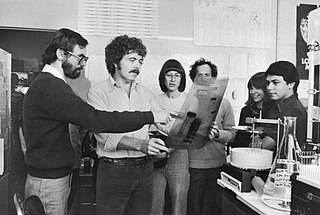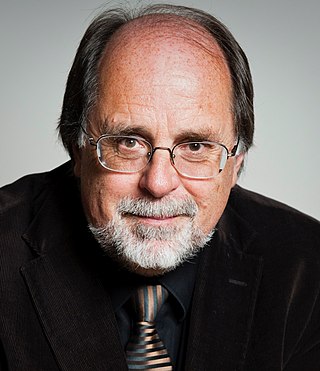Related Research Articles

Christiane (Janni) Nüsslein-Volhard is a German developmental biologist and a 1995 Nobel Prize in Physiology or Medicine laureate. She is the only woman from Germany to have received a Nobel Prize in the sciences.

Herbert Wayne "Herb" Boyer is an American biotechnologist, researcher and entrepreneur in biotechnology. Along with Stanley N. Cohen and Paul Berg, he discovered recombinant DNA, a method to coax bacteria into producing foreign proteins, which aided in jump-starting the field of genetic engineering.
The Stanford University School of Medicine is the medical school of Stanford University and is located in Stanford, California, United States. It traces its roots to the Medical Department of the University of the Pacific, founded in San Francisco in 1858. This medical institution, then called Cooper Medical College, was acquired by Stanford in 1908. The medical school moved to the Stanford campus near Palo Alto, California, in 1959.
Leena Peltonen-Palotie was a Finnish geneticist who contributed to the identification of 15 genes for Finnish heritage diseases, including arterial hypertension, schizophrenia, lactose intolerance, arthrosis and multiple sclerosis. She was considered one of the world's leading molecular geneticists.

The Johns Hopkins University School of Medicine (JHUSOM) is the medical school of Johns Hopkins University, a private research university in Baltimore, Maryland. Founded in 1893, the School of Medicine shares a campus with Johns Hopkins Hospital and Johns Hopkins Children's Center, established in 1889.
Thomas Eugene Shenk is an American virologist. He is currently Emeritus Professor of Life Sciences in the Department of Molecular Biology at Princeton University.
Genetic epidemiology is the study of the role of genetic factors in determining health and disease in families and in populations, and the interplay of such genetic factors with environmental factors. Genetic epidemiology seeks to derive a statistical and quantitative analysis of how genetics work in large groups.
Lars Walløe is a Norwegian academic, chemist, physiologist, and scientific adviser to the Norwegian government. He was the head of the Norwegian Delegation to the Scientific Committee of the International Whaling Commission, and he was honored by the Japanese government for having "contributed to the promotion of Japan’s policy in the field of fisheries". From 2002 to 2008 Walløe served as the president of Academia Europaea.

Göran K. Hansson, is a Swedish physician and scientist.

Erich Nigg is a Swiss cell biologist.
Jane Wardle FBA FMedSci was a professor of clinical psychology and director of the Cancer Research UK Health Behaviour Research Centre at University College London. She was one of the pioneers of health psychology in the UK and internationally, known for her seminal work on the contribution of psychology to public health, particularly the role of psychological research in cancer prevention and work on the behavioural and genetic determinants of eating behaviour and obesity.

Demetrios A. Spandidos is a Greek virologist and cancer researcher. He is an emeritus professor at the University of Crete where he was professor of virology from 1989 till 2015. He is also the founder of Spandidos Publications and the editor-in-chief of all eight of its journals.
David Chaim Rubinsztein FRS FMedSci is the Deputy Director of the Cambridge Institute of Medical Research (CIMR), Professor of Molecular Neurogenetics at the University of Cambridge and a UK Dementia Research Institute Professor.
Andrew Patrick Arthur Steptoe is a British psychologist and epidemiologist and Head of the Department of Behavioural Science and Health at University College London. He is a pioneer in health psychology and behavioural medicine in the UK and internationally, known for his work on psychosocial factors in cardiovascular disease, ageing, and positive wellbeing and health.
Mark Joseph Daly is Director of the Finnish Institute for Molecular Medicine (FIMM) at the University of Helsinki, a Professor of Genetics at Harvard Medical School, Chief of the Analytic and Translational Genetic Unit at Massachusetts General Hospital, and a member of the Broad Institute of MIT and Harvard. In the early days of the Human Genome Project, Daly helped develop the genetic model by which linkage disequilibrium could be used to map the haplotype structure of the human genome. In addition, he developed statistical methods to find associations between genes and disorders such as Crohn's disease, inflammatory bowel disease, autism and schizophrenia.

Kathleen Ries Merikangas is the Chief of the Genetic Epidemiology Research Branch in the Intramural Research Program at the National Institute of Mental Health (NIMH) and an adjunct professor of epidemiology at the Johns Hopkins Bloomberg School of Public Health. She has published more than 300 papers, and is best known for her work in adolescent mental disorders.

Ari Helenius is a Finnish emeritus professor of biochemistry who is known for his research in virology.
Louis J. Muglia is an American medical geneticist, endocrinologist and pediatrician noted for his research on premature birth and prenatal testing. Muglia was the A. Graeme Mitchell Chair and Directory of the Division of Human Genetics and Vice Chair for Research at Cincinnati Children's Hospital Medical Center. He was also the director of the Center for the Prevention of Preterm Birth at Cincinnati. In January 2020, Muglia became the President and CEO of the biomedical research foundation, the Burroughs Wellcome Fund.
The Institute for Molecular Medicine Finland (FIMM) is an international research institute which investigates the molecular mechanism of diseases by methods involving genetics and medical systems biology. The research combines technology and high-level research with unique patients and biobank materials. The aim of FIMM is to transfer research data to medical use in healthcare, i.e. improving and promoting personalised medicine.
Karl Tryggvason is an Icelandic medical researcher.
References
- 1 2 "Jaakko Kaprio Curriculum Vitae" (PDF). 2019-06-10. Retrieved 2019-08-18.
- 1 2 "Genetic Epidemiology". FIMM. 2016-06-01. Retrieved 2019-08-18.
- ↑ "Academy Professor Jaakko Kaprio appointed the new Director of the Institute for Molecular Medicine Finland FIMM". FIMM. 2015-09-07. Retrieved 2019-08-18.
- ↑ "Jaakko Kaprio". Nordic Life Science. 2015-12-26. Retrieved 2019-08-18.
- ↑ "Jaakko Arthur Kaprio". Member. Academia Europaea. Retrieved 2024-09-26.